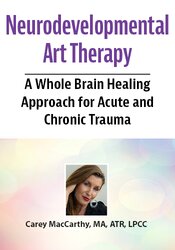
×

We know ART is a right brain creative activity with the power to access traumatic memories and body-based sensations stored in the right brain …
… and when you integrate creative expression with neuroscience, you set your clients on a path to healing and empowerment.
That’s the power of Neurodevelopment Art Therapy, a proven approach to trauma treatment. It’s designed to engage the whole brain, reprogram trauma responses, and build resilience resulting in long-term symptom reduction and overall well-being.
Join Carey MacCarthy, MA, ATR, LPCC, trauma expert, author, presenter, and voted Top Art Therapist of 2024 (IAOTP) who will teach you how the Neurodevelopmental Art Therapy Trauma Treatment Model will:
Through engaging case studies, discussions, and interactive art experiences, you’ll elevate your impact, enrich your practice, and help clients achieve lasting well-being through the transformative benefits of Neurodevelopmental Art Therapy.
Plus, this approach is culturally relevant, effective, and developmentally appropriate for diverse populations to heal and promote the preservation of spiritual and cultural heritage, shown to expedite trauma recovery in indigenous and non-indigenous cultures.
Join the future of trauma treatment today! Register now!
From Your Presenter:
”I am so excited to share my 23 years of trauma research and experience that has shaped and expanded the Neurodevelopmental Art Therapy Trauma Treatment Model! I’m taking all the guess work out by giving you step by step guidance for implementing this approach. I look forward to seeing you!” - Carey
All members of the PESI, Inc. planning committee have provided disclosures of financial relationships with ineligible organizations and any relevant non-financial relationships prior to planning content for this activity. None of the committee members had relevant financial relationships with ineligible companies or other potentially biasing relationships to disclose to learners. For speaker disclosures, please see the faculty biography.
Continuing education credit information is coming soon for this live webcast.

Carey MacCarthy, MA, ATR, LPCC voted top art therapist of the year 2024, and Who’s Who in America listee Founder/CEO of START UP! Art Therapy to Rewire Your Brain™. Carey is an author, presenter, speaker, and researcher, a Registered Art Therapist with the Art Therapy Credentials Board, and a Licensed Professional Clinical Counselor, active within the art therapy profession since 2001. She is a recognized trauma expert specializing in trauma within children, adults, and Native American Historical Trauma.
Carey co-authored, with Linda Chapman START UP!™: A School-Based Arts Curriculum for Native American Youth and ALL Cultures: Interventions for Development and Learning, Facilitators Manual (2017). Chapman has since passed her work onto Carey to continue its expansion and global reach. Carey has lived in Native American Reservations and trained in the Red Road Approach to Healing for Tribal Nations and is a fluent Spanish speaker. Her mission is to help rebuild the First Nations People. Carey believes that healing should be accessible to ALL People of ALL Ages & ALL Cultures.
Speaker Disclosures:
Financial: Carey MacCarthy maintains a private practice and is the founder of Start Up! Art Therapy and Indigenous Healing Arts Alliance Non-Profit Organization. She receives a speaking honorarium from PESI, Inc. She has no relevant financial relationships with ineligible organizations.
Non-financial: Carey MacCarthy is a member of the American Art Therapy Association and Art Therapy Credentials Board.
For live CE credit, you must watch the live webcast in its entirety at its scheduled time and complete the CE quiz and evaluation within one week. You will have access for 90 days after the program for review.
Please note: There will be a 70-minute lunch and two 15-minute breaks; one in the morning and one in the afternoon. Lunch and break times will be announced by the speaker and at their discretion. A more detailed schedule is available upon request.
Visit our FAQ page at https://www.pesicanada.ca/faq or contact us at https://www.pesicanada.ca/contact-us.
Satisfaction Guarantee
Your satisfaction is our goal and our guarantee. Concerns should be addressed to info@pesicanada.com.
Please wait ...